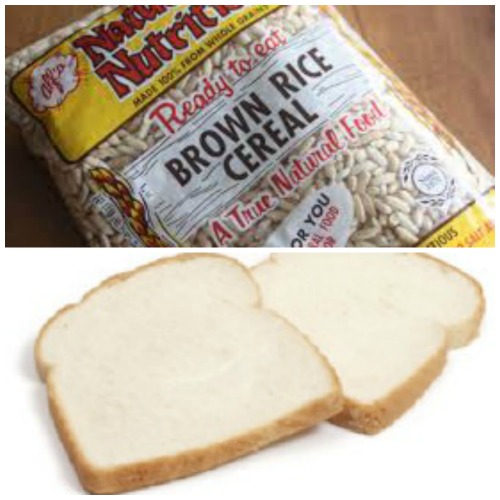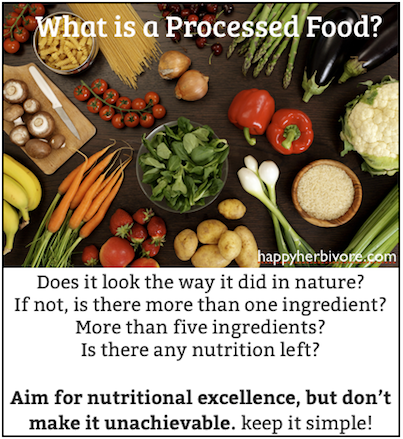I've been getting a lot of emails asking for an explanation of the term "processed" — what is a processed food exactly? Is X food more processed than Y food? Is Z food processed?
Here's an example of a recent email:
My sister contends that both wine and oils are processed, so is wine not okay as oil is not okay? Any suggestions?

Anything that isn't a whole food is technically processed. For example, applesauce is technically processed, since it's not the whole apple. Pureed butternut soup made at home has technically been processed, too, but I (personally) feel you can't lump these "processed" foods into the same "processed food" category as an Oreo or pretzel (or oil).
Similarly, while all bread is technically "processed" (there is no whole-wheat bread tree, after all), I feel you can't lump whole-wheat bread made with just flour, water and yeast in your kitchen in the same category as white bread with a laundry list of ingredients you can't pronounce.
So, in a way, yes, your sister is correct, because anything not in its whole form from nature has been processed, but my interest is in to what extent.
There are different levels and degrees to processing and processed foods.
It also matters about the end result — Is there any nutrition left?
The problem with most processed foods (like oil or white flour) is that all or most of the nutrition has been stripped away.
This is where the term "empty calories" comes from. With white flour, for example, all the bran, fiber, germ, etc. has been removed. Sometimes the flour is also bleached.
In fact, white flour is so devoid of nutrition after processing that the FDA requires some vitamins and minerals be artificially added back in before it can be sold, hence, why you see "enriched flour" in a list of ingredients.
So instead of worrying about if the item is processed, I argue to worry if it still has any nutrition left.A level of processing is not necessarily an indicator.
For example, one could argue puffed brown rice (to make rice cakes or whole grain cereal) undergoes pretty heavy processing, but in the end, the brown rice and its nutrition has stayed intact for the most part. (And puffed brown rice is still much more nutritious than white bread, pretzels, potato chips or white rice, which arguably underwent less processing but nevertheless have little nutrition and are "empty calories.")

Now, is puffed brown rice as healthy and whole as brown rice? No, it's still a processed food anda little is always "lost in transformation,"yet it is still an arguably healthier option despite the processing because it's still nutritious.
There is no nutritive value to oil. It's pure fat. It has nothing else to offer. One tablespoon of oil has about the same calories and fat as a small Snickers bar, except the Snickers bar is arguably healthier because it provides some carbohydrates, protein, vitamins and minerals, where the oil provides little to none. Even white sugar has more to offer in terms of nutrition than oil. (If you don't believe me, compare the labels at the grocery store. ;)
Now, I'm not going to argue wine, or beer, or vodka is a health food — it's not (no alcohol is) — but these spirits are not in the same class as oil or an Oreo or French fries either. Yes, the wine, hops, potatoes, etc. have been heated or cooked or squished or fermented — processed in some way, but I'm not sure I'd lump in a organic beer or a shot of quality tequila with an Oreo or pretzel, but that's me.
Provided someone doesn't have a medical condition that can be worsened or have complications from consuming alcohol, they are over the legal drinking age, and they are not abusing alcohol, I don't see a problem with having a glass of wine, a beer, or a cocktail from time to time if that's your thing.
Of course, this view on alcohol, as well as my interpretation of the word "processed" is just my opinion and I'm sure there are others who have different opinions or definitions as to what is or what is not processed.
The point I hope to make is that we all need to find balance but, no, I don't think all foods still not in their untouched al-natural form are "bad" or "processed."
In fact, I refuse to refer to foods as "good" or "bad" (please read that post)
A good rule of thumb:Does it look the way it did in nature? If not, is there more than one ingredient? More than five ingredients? Keep it simple.
Fresh foods are ideal, but there's nothing wrong with frozen veggies, canned beans, spices or corn tortillas. The goal is get processed foods out of our diet and eat more healthfully but please don't feel you need to go to an extreme with it, especially if you are new and still transitioning.
I'm not a fan of utopia because it rarely exists in the real world. Do the best you can. Frozen spinach is better than no spinach at all. Unsweetened applesauce is better than no fruit at all, and so on.
I want you to aim for nutritional excellence, but I also don't want it to be unachievable.
I use the term "processed" to mostly signify foods that have been made and prepared by companies or manufacturers to sit on a shelf: faux meats and cheeses (i.e., Daiya and Boca burgers), TV dinners, cookies, chips, pretzels. That's what I'm talking about; "foods" you know you probably wouldn't find at a farmers' market or in the produce section of the grocery store. ;)

I always tell my clients, "Use your noggin — you know what's healthy!"
As I hope I've demonstrated in this post, I think there is a sliding scale with "processed."
For example, mustard is technically processed, but you can't compare it to an Oreo. Plus, when you're using mustard, you're using just a little for flavor. I personally feel there is a difference there too.
I also don't think it's fair to lump a homemade vegan muffin made with whole-wheat flour, bananas, no oil, etc. in the same group as the junkier version they sell at Starbucks.
The goal is to get highly processed junk out of the diet. I encourage you to find your own balance so that eating a whole foods, plant-based diet is realistic for you. (We're all coming from a different place, so what's an easy change for one person might be a drastic 180-degree turnaround for someone else).
You can make more improvements over time — I certainly have.

and if you need a little help or guidance... or you just want to make it easier on yourself, I can't recommend our the meal plans enough!













